
The Maloti Mountains, which form part of the Drakensberg escarpment, are the highest range in Africa south of Kilimanjaro and support a varied range of wildlife and plant species, including many that are unique to the region. The kingdom's birdlife is strongly influenced by the mountainous terrain, with a mix of montane, grassland and wetland species. From the striking Southern Bald Ibis to the elusive Mountain Pipit, Drakensberg Rockjumper and Bearded Vulture, the birdlife of Lesotho is as diverse as it is captivating.
BirdLife South Africa, in collaboration with the Lesotho Highlands Development Authority (LHDA), organised a bird atlasing expedition to northern Lesotho in March 2023. Its purpose was to survey and map the distribution of bird species in the region and to provide training to LHDA staff on bird monitoring and grassland ecology. The expedition was led by experienced birders Melissa Whitecross, Carina Pienaar and Ernst Retief, and they were joined by bird experts and volunteers, including David Maphisa (who as a young herd boy in Lesotho taught himself to recognise birds), Christina Hagen, Alan Lee, cousins Morné and Bernard Pretorius, and photographer Cassie Carstens. We explored a range of landscapes, from rural settlements and agricultural fields to high-altitude mountain peaks, to obtain a comprehensive snapshot of the birdlife in the region. The purpose from the conservation perspective was to fill the gaps in a previous avian baseline survey completed as a requirement for the construction of the Polihali Dam.
This story is from the July/August 2023 edition of African Birdlife.
Start your 7-day Magzter GOLD free trial to access thousands of curated premium stories, and 9,000+ magazines and newspapers.
Already a subscriber ? Sign In
This story is from the July/August 2023 edition of African Birdlife.
Start your 7-day Magzter GOLD free trial to access thousands of curated premium stories, and 9,000+ magazines and newspapers.
Already a subscriber? Sign In

EXPLORING NEW HORIZONS
Keith Barnes, co-author of the new Field Guide to Birds of Greater Southern Africa, chats about the long-neglected birding regions just north of the Kunene and Zambezi, getting back to watching birds and the vulture that changed his life.

footloose IN FYNBOS
The Walker Bay Diversity Trail is a leisurely hike with a multitude of flowers, feathers and flavours along the way.
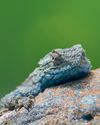
Living forwards
How photographing birds helps me face adversity
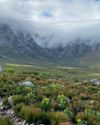
CAPE crusade
The Cape Bird Club/City of Cape Town Birding Big Year Challenge
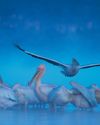
water & WINGS
WATER IS LIFE. As wildlife photographer Greg du Toit knows better than most.
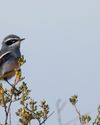
winter wanderer
as summer becomes a memory in the south, the skies are a little quieter as the migrants have returned to the warming north. But one bird endemic to the southern African region takes its own little winter journey.

when perfect isn't enough
Egg signatures and forgeries in the cuckoo-drongo arms race

Southern SIGHTINGS
The late summer period naturally started quietening down after the midsummer excitement, but there were still some classy rarities on offer for birders all over the subregion. As always, none of the records included here have been adjudicated by any of the subregion's Rarities Committees.

flood impact on wetland birds
One of the features of a warming planet is increasingly erratic rainfall; years of drought followed by devastating floods. Fortunately, many waterbirds are pre-adapted to cope with such extremes, especially in southern Africa where they have evolved to exploit episodic rainfall events in semi-arid and arid regions. But how do waterbirds respond to floods in areas where rainfall - and access to water - is more predictable? Peter Ryan explores the consequences of recent floods on the birds of the Western Cape's Olifants River valley.
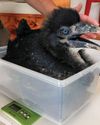
a star is born
It’s every producer’s dream to plan a wildlife television series and pick the right characters before filming.